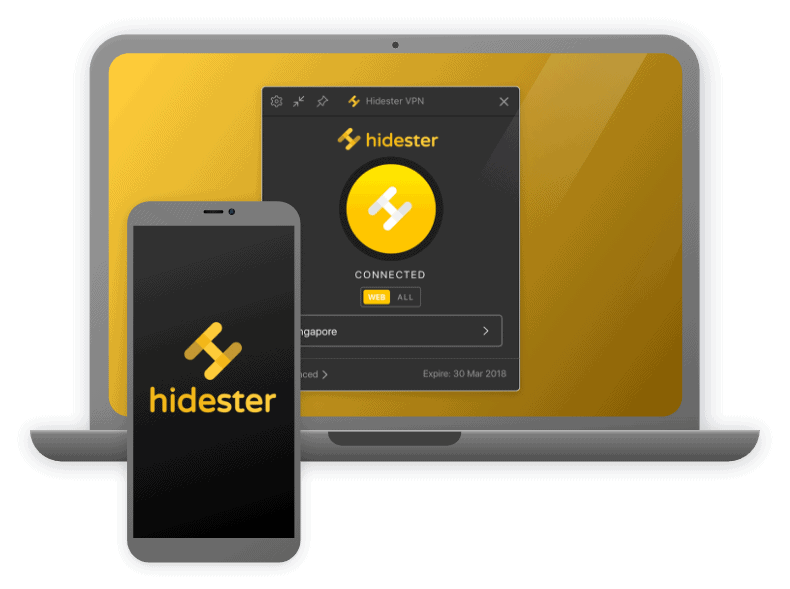Surfshark Review: Is It Any Good?
Read on for our close-up look at Surfshark, one of the most versatile VPNs out there.
 Aliza Vigderman, Senior Editor, Industry Analyst
&
Aliza Vigderman, Senior Editor, Industry Analyst
&
 Gabe Turner, Chief Editor
Last Updated on Jul 11, 2025
Gabe Turner, Chief Editor
Last Updated on Jul 11, 2025
What We Like
- Camouflage Mode: With this feature, Surfshark hid the fact that we were using a VPN. It’s useful if you’re in countries with VPN restrictions such as China and Russia.
- Versatile and robust VPN connections: Surfshark offers various VPN protocols, from OpenVPN to the newer WireGuard protocol.
- Unlimited simultaneous connections: We didn’t have to worry about the number of devices we connected to Surfshark at any given time.
What We Don't Like
- IP address logging: Surfshark may record IP addresses, which isn’t best practice for “no-logs” VPNs.
- Based in the Netherlands: The country is part of the Nine Eyes, which means the government can compel Surfshark to share customer information when necessary.
- Price: While Surfshark is affordable if you’re buying a long-term subscription (one year or more), its monthly plan costs a steep $15.45 per month.
Bottom Line
Surfshark is one of the most popular VPNs on the market and for good reason. In fact, we rated it as one of the best VPNs of 2025. Unfortunately, it isn’t the cheapest VPN on the market, especially if you don’t commit to the two-year plan. So, is Surfshark worth the subscription fee?
During our most recent tests, we found Surfshark covers all of the essential bases: a large server fleet, fast speeds, standard features, and more. However, people worried about privacy should be wary about swimming with Surfshark. The company is based in the Netherlands, which can legally compel companies to share customer data. Also, Surfshark stores IP addresses from the time users log on until 15 minutes after they disconnect. Let’s get into the pros and cons to see if this VPN is for you.
FYI: Want to know what VPN did top our list of best VPNs? Spoiler alert – it was NordVPN. It scored 9.7 out of 10 against Surfshark’s 9.5 rating. Check out our NordVPN review to find out why it’s our favorite.
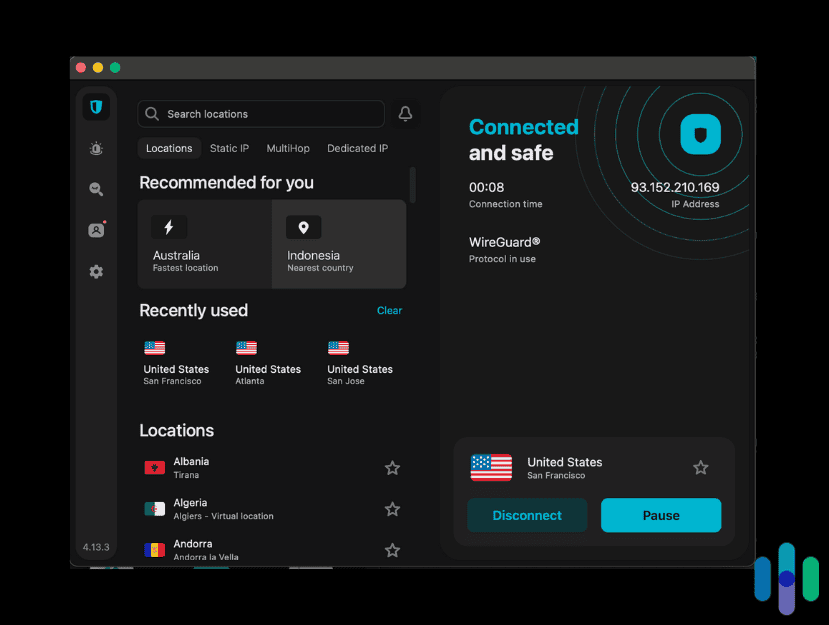
Surfshark Features Overview
| Kill switch | Available |
|---|---|
| Split tunneling | Available |
| Servers | 3,200+ in 100 countries (all RAM-based) |
| Obfuscation | Camouflage Mode and NoBorders Mode |
| VPN protocols | WireGuard and OpenVPN |
Overall Rating
- No-logs VPN company based in the Virgin Islands
- Allows unlimited connections, double VPN, and split tunneling
- Choice of OpenVPN, WireGuard, and IKEv2
Video Review
Company Background
The location where a VPN is based is very important because of the privacy laws there. Surfshark is based in the Netherlands, which is relatively privacy-friendly. However, Holland is party to international agreements that involve the sharing of intelligence with other nations. This could result in innocent users of Surfshark getting swept up in an international crime sting.
Surfshark tries to assure customers and potential customers by having a “no logs” policy, which means the company does not collect information on user activity. However, it does collect information related to your identity and it must collect information to process payments. This means it could tell authorities that you are a customer and where you’re located, but not what files you downloaded or websites you visited.
Surfshark also records your IP address when you connect, and stores it for up to 15 minutes after you disconnect, which has been confirmed by a third-party audit.1 Knowing your IP address isn’t harmful unless using a VPN is outlawed in your area. It can’t be used to track your VPN activity.
Note From Our Experts: While we’re fine with Surfshark’s IP address logging, there are better VPNs than Surfshark in this area. Our roundup of the best “no-logs” VPNs includes options like NordVPN, Private Internet Access, ExpressVPN, and PureVPN.
Surfshark Features
Now that you know Surfshark as a company, it’s time to get to know Surfshark as a VPN. We tested Surfshark on multiple devices and saw a VPN capable of encrypting web activity and hiding IP addresses from websites and online services. We proved that with the DNS and WebRTC leak tests we performed on the VPN.
We expect this from every VPN though. Surfshark has a lot more to offer, including allowing you to download torrents, unblocking geo-locked content, and letting us run some traffic through its VPN and some apps via our normal connection. Let’s run through each of these security features in more detail.
Torrenting and Streaming
Based on our annual VPN consumer report, we know most people use this service to access online content not locally available to them. That’s why we made pages dedicated to the best streaming VPNs and the top torrenting VPNs. As a disclaimer, in the U.S., using a VPN to torrent copyrighted materials is against the law.
Surfshark allowed us to safely torrent non-copyrighted materials, with additional features such as Camouflage mode to make the experience even better. The speeds were also great most of the time. Our torrent downloads didn’t last any more than they normally do when we’re downloading without a VPN. That’s always a good sign that the VPN is technologically capable of providing good internet speeds.
As for streaming, we named Surfshark one of the best Netflix VPNs. It changed our Netflix region in a snap, and easily bypassed Netflix’s VPN blocker. Surfshark also offers native apps for smart TVs making it easy to access geo-restricted content on any Android or Apple TV.
Expert Tip: A lot of internet-connected devices don’t support VPN apps, including gaming consoles like PlayStation and Xbox. For such devices, Surfshark is a great option as you can set up Surfshark on a Windows laptop and use it as a virtual router. Having a dedicated VPN router is another way, although setting up a VPN router takes some technical know-how.
Camouflage and No-Borders Mode
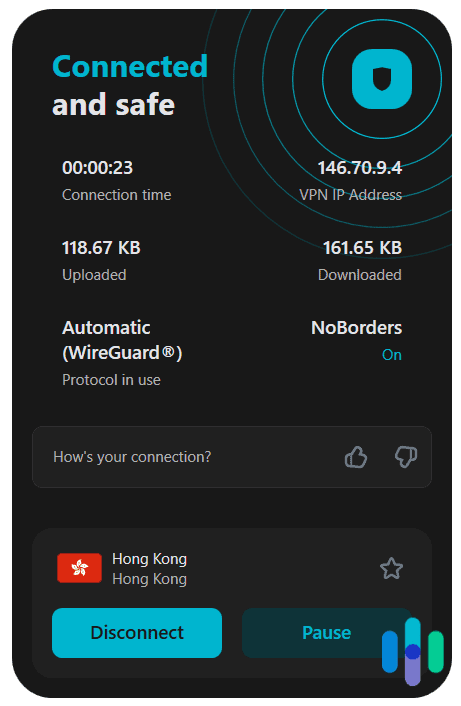
Camouflage Mode, also called obfuscation, can hide that you’re using a VPN. That is a critical feature in places like China, where you can get in trouble for hiding your browsing activity without using a government-approved VPN. As you may have guessed, VPNs approved by the Chinese government provide backdoor access to their networks. Because it offers Camouflage Made, Surfshark is one of the VPNs we recommend for users in China.
NoBorders Mode, on the other hand, automatically kicks in when Surfshark detects that you’re in a restrictive country and will limit your selection of servers to those designed to bypass censorship specifically. It doesn’t just work in restrictive countries. It also kicks in when Surfshark detects that your network might block VPN traffic, such as office and campus networks.
To be clear, we always recommend using this technology in accordance with the laws of your jurisdiction.
Pro Tip: Have an overseas trip coming up? A VPN is a great travel companion. We found Surfshark to be one of the best VPNs for traveling when we’re abroad. The excellent privacy features give us peace of mind when we connect to public hot spots and the hotel Wi-Fi.
Kill switch
Connections drop out. It happens. But it also means it can expose your online activities to your ISP. A kill switch instantly disrupts all your internet traffic to avoid this from happening. That’s why it’s a necessary VPN feature. Thankfully, Surfshark has one.
When our Wi-Fi dropped unexpectedly during one of our tests, the kill switch immediately stopped our internet connection while waiting for Surfshark to reconnect. It’s lucky it did because we were doing our torrent download test at the time. If there was no kill switch, it might have run alarm bells with our ISP.
Split tunneling
Surfshark’s Bypasser lets you choose apps and websites to run through your normal connection instead of the VPN. For example, we don’t run Spotify through our VPN since it’s an app known for requiring a ton of bandwidth to run. This way, we get faster speeds on websites and apps using our VPN connection.
It’s also handy for websites that track your IP address, like your bank. If the website doesn’t recognize your credentials, it might lock you out. Running it through Surfshark’s Bypasser avoids having to call them and fill out a pile of paperwork to regain your access.
Dedicated IP Address
Dedicated IP addresses cost an extra $3.75 per month on top of your subscription. That’s cheaper than NordVPN, which charges $4.19 per month on a two-year plan. You also get to choose the location of your dedicated IP address. Some of the places on offer include Los Angeles, London, Sydney, and Tokyo.
As we mentioned earlier, your IP address changes once you log into a VPN server. You don’t have any control over what is assigned to you, and it changes every time you log on. This is known as a dynamic IP address. A dedicated IP address is yours exclusively.
>> Learn More: Dynamic and Static IP Addresses
Most VPNs share IP addresses among their users. So, if another user gets blacklisted by Netflix or Disney+, you won’t be able to connect to those services if you get that IP address. Also, if Google sees many different users are connecting to its services with the same IP address, it will ask subsequent users with that IP to solve CAPTCHAs as a way to fend off bots.
A dedicated IP address solves these issues. If you buy a subscription to one, Surfshark will give you an IP address only you can use. And with your own VPN IP address, you won’t have to worry about IP blacklisting anymore.
Pro Tip: Another scenario where a dedicated VPN IP address is useful is if you’re connecting to a private server – either an FTP server at home or in the office, for example. These servers can be configured to only allow certain IP addresses to connect, which would be impossible to do if you’re using a regular VPN. But if you have your own dedicated IP address, you can set your office or home server to let that IP address through.
Dynamic MultiHop
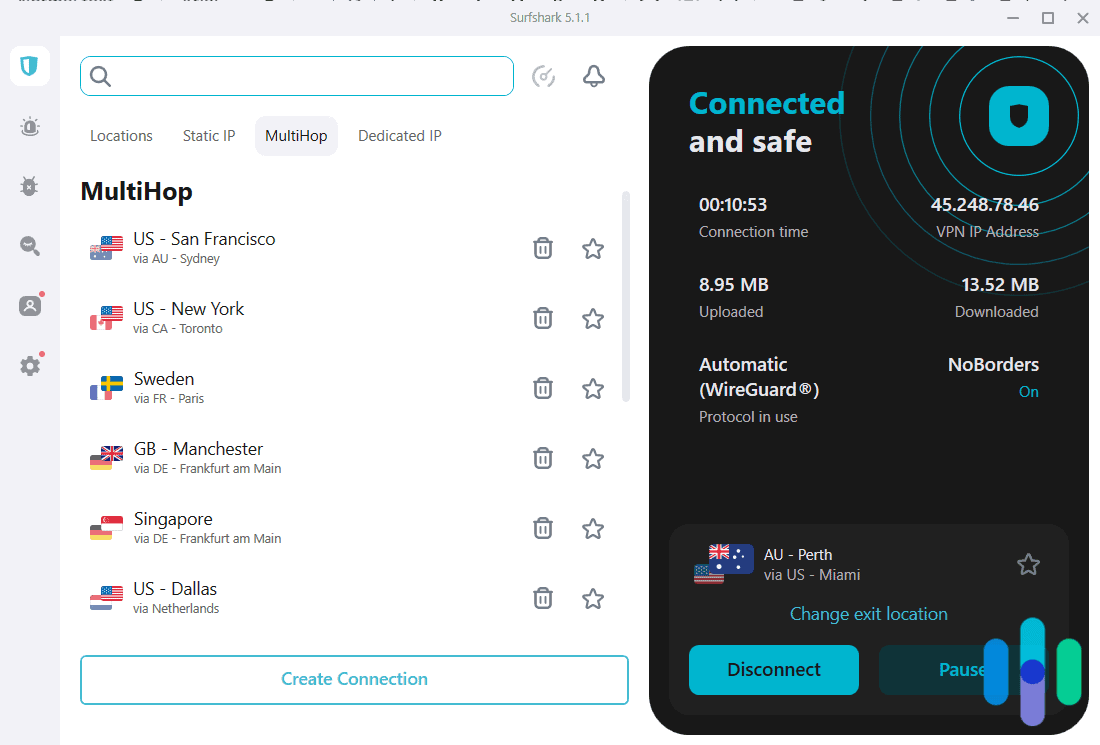
Want some extra security and privacy? MultiHop, otherwise known as a double VPN, connects you through two VPN servers. That means twice the data encryption and double the privacy. We see the same from other top-rated VPNs, including NordVPN (called Double VPN).
What sets Surfshark apart is the ‘Dynamic’ aspect. Most VPNs that offer multihopping have pre-selected server pairs. That limits your ability to change your device’s location because only a few server pairs are available. For example, at the time of writing, NordVPN offers nine multihop server pairs.
With Surfshark, you can designate your first and second servers to be used for multihopping. We suggest choosing a server close to you for the first (entry) server, and then your desired IP address location for the second (exit) server. That will give you better speeds than traditional multihopping.
Alternative ID
This isn’t a VPN feature per se, but it helps protect your privacy and anonymity. And with Surfshark, you get this feature no matter which package you go for.
Alternative ID does exactly what its name implies. It gives you an alias. Let’s say a news site makes you register to read a particular article, but you don’t want to provide your real name and email address. With Alternative ID, you can create a fake persona with a name, email address, and even birthday. This protects you from unwanted solicitations and keeps your information safe from potential data breaches.
Surfshark added the Alternative ID feature in 2023 as part of the Surfshark One package, which we’ll discuss next. But in January 2024, it made the feature available to all Surfshark subscribers.
Surfshark One
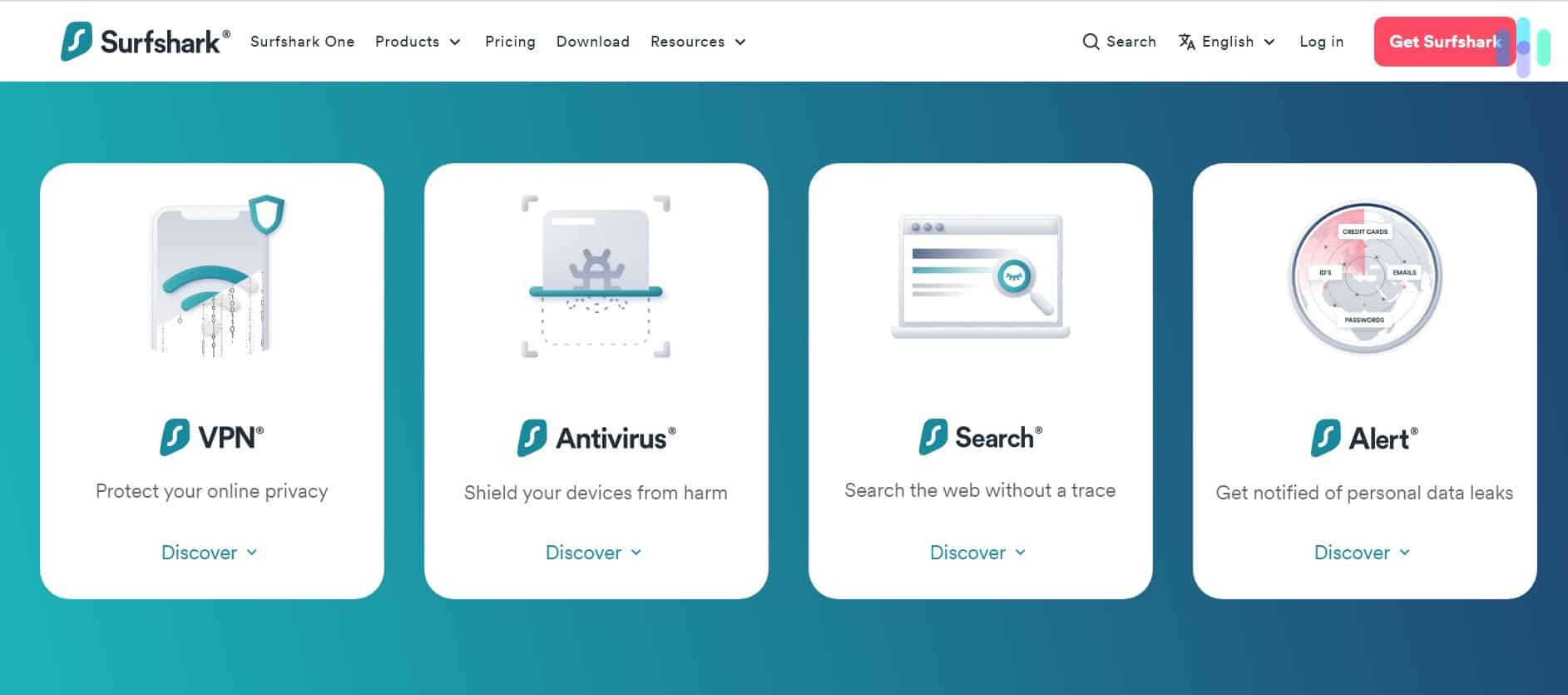
Lastly, Surfshark One is an all-in-one digital security subscription that includes access to the Surfshark VPN, antivirus software, secure search engine, and identity monitoring service.
Surfshark One is designed to enhance your online privacy and identity protection using a combination of those features. The antivirus software protects you from malware that could be used to steal digital data. The identity monitoring service monitors the internet for breaches that contain your personal data. The secure search engine offers an alternative to popular search engines that can be risky to your privacy, such as Google.
Surfshark One is $2.49 per month on a two-year plan and includes all the features we mentioned earlier. There’s also Surfshark One+ for $3.99 per month on a two-year subscription that adds personal data removal by Incogni. Surfshark One and Surfshark One+ are available in 12-month and monthly subscriptions.
FYI: To learn more about Surfshark’s antivirus software, read our Surfshark Antivirus review. It recently it made our list of the best antivirus software.
How Fast Is Surfshark?
It’s no secret that using a VPN tends to slow down your internet speed, as your online traffic has to go through encryption and be routed through a VPN server. Fast VPNs, however, can keep the speed loss to a minimum.
To test Surfshark’s speed, we connected both a Macbook Pro running macOS and an Acer laptop with Windows 10 to the VPN and performed a few speed tests. It performed better on the Macbook, but its performance on Windows wasn’t half bad either.
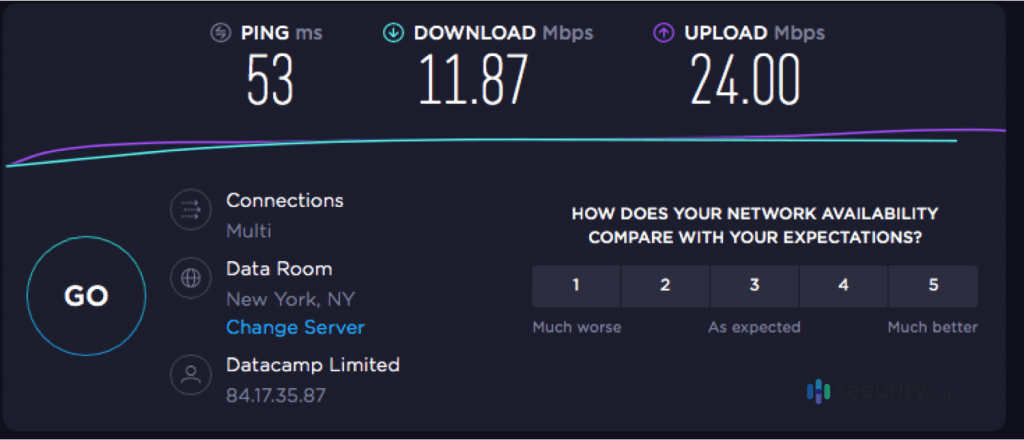
However, speed is determined by a large number of factors, including your distance to the server, device make and model, operating system, browser type, and more, so take our speed tests with a grain of salt.
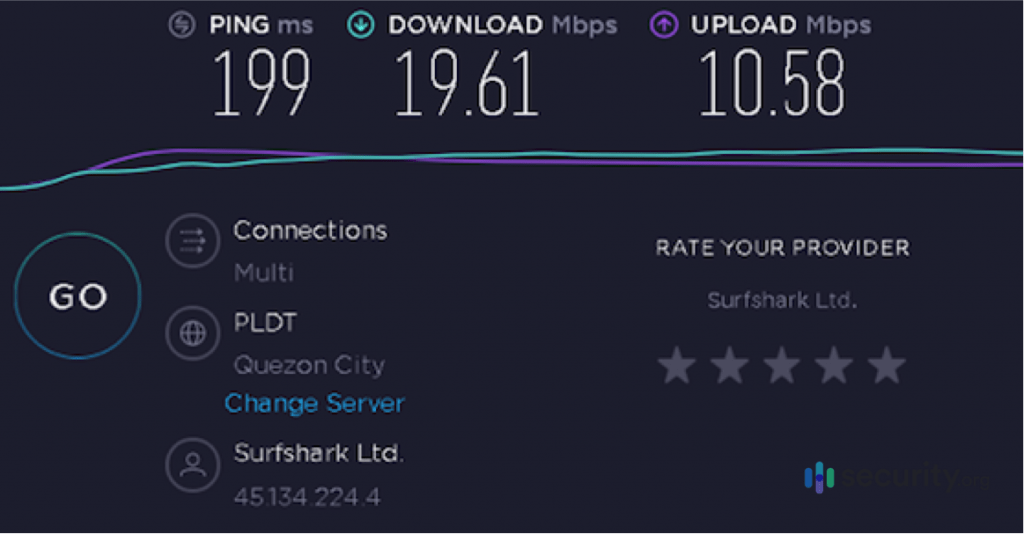
Later, we tested Surfshark again against other VPNs, and we used a more comprehensive testing process this time around. While Surfshark didn’t come out the fastest, its performance was solid, delivering high download speeds, passable upload speeds, and a consistent latency. You can read more about this test on our VPN speed test page.
| Devices tested on | MacBook Pro 2011 | Acer Aspire 5 (Windows 10) |
|---|---|---|
| Ping without VPN (in ms) | 54 | 7 |
| Ping with VPN (in ms) | 53 | 199 |
| Ping difference | 2% | 2742% |
| Macbook download speed without VPN (in mbps) | 16.21 | 23.69 |
| Download speed with VPN (in mbps) | 11.87 | 19.61 |
| Download speed difference | 31% | 17% |
| Upload speed without VPN (in mbps) | 22.01 | 24.09 |
| Upload speed with VPN (in mbps) | 24 | 10.58 |
| Upload speed difference | 9% | 56% |
How Secure Is Surfshark?
If your VPN isn’t taking good care of your data, you may be experiencing a “the call is coming from inside the house” situation. But have no fear: we walked around this proverbial house checking under every bed frame, and here’s what we came out with.
Encryption Methods
Using outdated encrypted methods is kind of like using an old lock on a safe; sure, it’s better than nothing, but we want better protection for our valuables. So, after some digging, we found that Surfshark encrypted our information using AES 256-bit, which is what we expect from VPNs in 2025.
On top of that, Surfshark encrypted our traffic through multiple servers, hiding our web traffic even more. This isn’t usually the case for even the best VPNs on the market, so we feel good about Surfshark protecting our web activity.
Logging Policy
But that wasn’t enough for us. No, we wanted to actually read the fine print of Surfshark’s privacy policy to see what data of ours they kept and vice versa. Our findings?
- What Surfshark logs: When you sign up for the service, you must provide an email address and payment information. If you’re worried about being identified with this information, you could use an ‘alias’ email and pay with crypto. Surfshark also collects your user ID and IP address when you connect to its servers. Their policy states they delete that information within 15 minutes of your session ending.
- What Surfshark doesn’t log: Surfshark didn’t keep our session information, browsing history, the times we connected, the amount of bandwidth we used while connected to the VPN, our network traffic, etc.
You might be worried about Surfshark’s IP address tracking – and you have good reasons to. Hiding one’s IP address is one of the core functions of a VPN, so if your VPN records your real IP address, it defeats the purpose of using a VPN in the first place.
Surfshark only keeps IP addresses for a maximum of 15 minutes after a session ends. It doesn’t permanently store that information.
The IP address also doesn’t have much use without other relevant VPN usage data. To track a VPN user, someone would need both the IP address they used to connect to the VPN, the VPN server they connected to, and the browsing history from that server. By not logging any of those other types of information, Surfshark keeps its users private.
| Data | Does Surfshark log it? |
|---|---|
| IP addresses | Yes, but immediately removes it after a session |
| Browsing history | No |
| Session information | No |
| Used bandwidth | No |
| Time stamps | No |
| Network traffic | No |
| User’s email address | Yes |
| User’s password | Yes |
| Payment data | Yes, unless you use anonymous payment methods such as cryptocurrency |
>> Learn More: The Best “No-Logs” VPNs
DNS Leak Tests
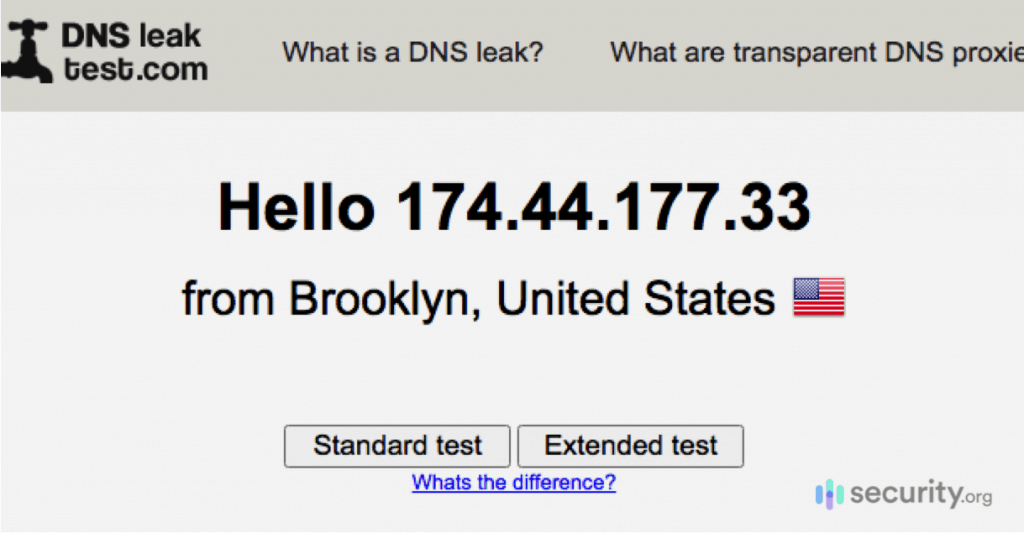
A DNS is a domain name server, meaning, the common name that comes with an IP address; think Security.Org (our domain name) as opposed to 13.35.89.25, one of our website’s IP addresses.
Of course, if a VPN isn’t hiding our DNS when connected, something is off, which is why we tested it out. Fortunately for us, the test showed a different IP address when connected versus not connected. That means Surfshark hid our web activity when we tested it out on both our Mac and Windows computers. Checkmate!
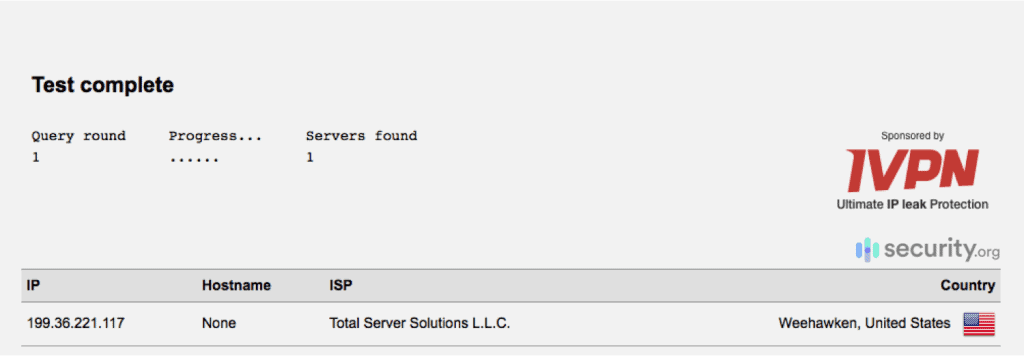
WebRTC Leak Tests
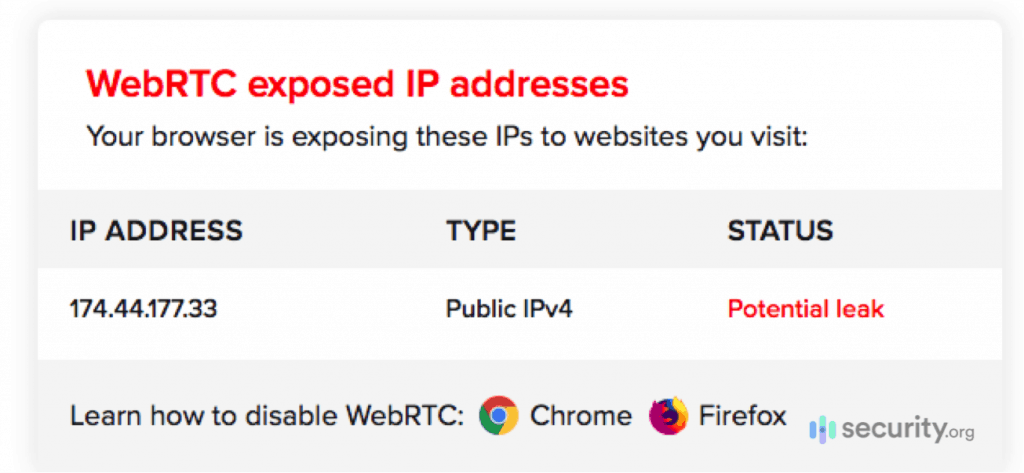
Finally, we also performed a WebRTC leak test using Surfshark. A little background info: whenever we video chat with friends, transfer files, or live stream Netflix, our computers use something called WebRTC, which is basically a collection of technologies that let web browsers communicate directly with each other as opposed to going through a middle-man server.
Sure, this creates faster speeds and rids us of excessive lag, but it also requires the two devices to know each other’s private IP address; no thank you. The question remained: did Surfshark leak our private IP addresses?
The short answer is: no, it didn’t. Even while we chatted on video, Surfshark hid our real IP addresses. So as far as privacy and security are concerned, Surfshark is at the top of its game.
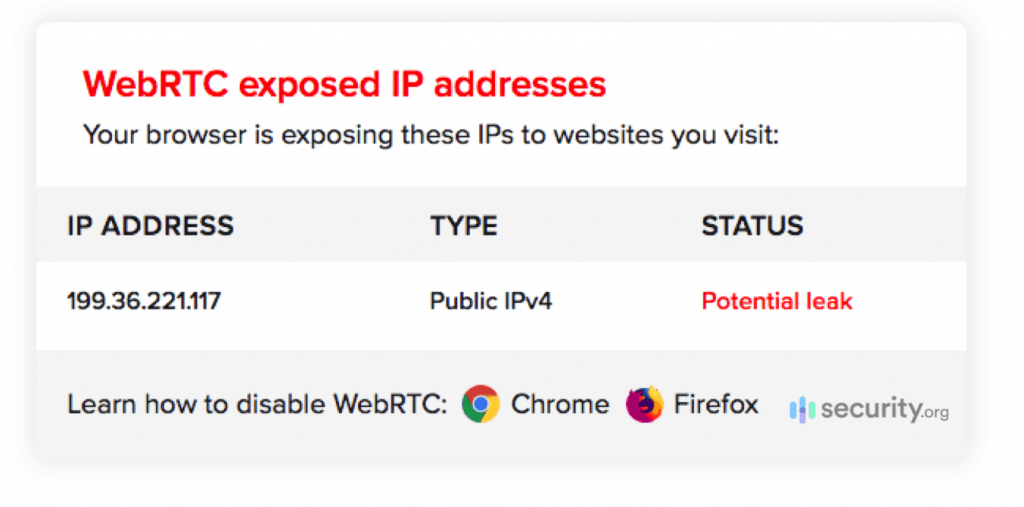
Tip: Firefox, Opera, Chrome, and Microsoft Edge all default to WebRTC, making them more vulnerable to WebRTC leaks. If you’re streaming content, video chatting or transferring files on any of these browsers, make sure to connect to a VPN beforehand.
Surfshark Pricing Overview
Obviously, to enjoy all those features, you need a subscription. And here’s the thing: Surfshark can both be affordable and pricey, depending on how long you’re planning to use the service. Here’s a quick overview of Surfshark’s pricing for its VPN:
| Surfshark Starter | 1 Month | 1 Year (+3 Months Free) | 2 Years (+3 Months Free) |
|---|---|---|---|
| Total price | $15.45 | $50.85 | $53.73 |
| Average monthly cost | $15.45 | $3.39 | $1.99 |
All those subscriptions offer the same features, so all you have to consider is whether you want to use Surfshark for a month or a year or two. Surfshark is notably pricey if you’re looking to buy a one-month subscription. That $15.45 per month adds up to $185 in a year. Fortunately, you can opt to buy a one-year or two-year subscription for much less than that.
That’s usually the case for VPN subscriptions, though. For example, NordVPN’s costs drop to $3.39 per month from $12.99 if you purchase a two-year plan. That’s why we consider Surfshark more affordable even though NordVPN’s monthly subscription costs less. Check out our Surfshark vs. NordVPN to see if the NordVPN’s higher price tag is worth it for you.
FYI: Students registered with Student Beans can get 15 percent off a Surfshark subscription. We recommend signing up for two years to get the lowest rates.
With prices as low as $1.99 a month for its two-year package, Surfshark isn’t only secure; it’s also about as cheap as VPNs come. For more information, read our Surfshark subscription page, or read about Surfshark deals and Surfshark Black Friday deals.
Find out if Surfshark can protect your home like other VPNs
We tested Surfshark and compared it side-by-side with other brands to give you the full picture.
>> Discover: Our Favorite Surfshark VPN Alternatives
Our Surfshark Research and Data
The following is the data and research conducted for this review by our industry-experts. Learn More.
Encryption
| In Transit | Yes |
|---|---|
| At rest? | Yes |
| All network communications and capabilities? | Yes |
Security Updates
| Automatic, regular software/ firmware updates? | Yes |
|---|---|
| Product available to use during updates? | No |
Passwords
| Mandatory password? | Yes |
|---|---|
| Two-Factor authentication? | Yes, must opt in |
| Multi-Factor authentication? | Yes |
Vulnerability Management
| Point of contact for reporting vulnerabilities? | security@surfshark.com |
|---|---|
| Bug bounty program? | Yes |
Privacy Policy
| Link | https://surfshark.com/privacy-policy |
|---|---|
| Specific to device? | No |
| Readable? | Yes |
| What data they log | Email address, billing info, diagnostic reports, advertising ID, IP address, connection time stamps |
| What data they don’t log | Visited IP addresses, browsing history, session information, used bandwidth, network traffic |
| Can you delete your data? | Yes |
| Third-party sharing policies | Shares information with third parties for marketing, payment processing, and other services. |
Surveillance
| Log camera device/ app footage | n/a |
|---|---|
| Log microphone device/ app | n/a |
| Location tracking device/ app | No |
Parental Controls
| Are there parental controls? | No |
|---|
Company History
| Any security breaches/ surveillance issues in past? | No |
|---|---|
| Did they do anything to fix it? | n/a |
Additional Security Features
| Anything like privacy shutters, privacy zones, etc.? | n/a |
|---|
Recap
Like any other VPN, Surfshark has its flaws, but they’re very minimal and the benefits definitely outweigh the costs, financial and otherwise. With military-grade encryption, an impressive privacy policy, and extremely low prices, Surfshark is a good fit for most people who want to hide their web activity.
We’d recommend Surfshark if you want…
- A strict logging policy
- Netflix and torrenting
- VPN service with optional antivirus, identity monitoring, and secure browser
But Surfshark is not for you if any of the following are deal-breakers…
- Slow speeds on Windows
- Servers store IP addresses but deletes them shortly after disconnecting
Using a VPN isn’t the only way to protect yourself online. Check out our list of the best digital security practices for more tried and tested methods.
Surfshark FAQs
Surf’s up! We’re not done riding the wave of Surfshark, so sit back, relax and enjoy the answers to our most frequently asked questions.
-
Is the Surfshark VPN any good?
Surfshark is a very good VPN and is among one of the best VPN services, with AES-256 bit encryption, a kill switch, split tunneling, Netflix, and torrenting access, plus a headquarters outside of the Five Eyes alliance. And with more than 3,200 VPN servers in 65 countries, it can work for users around the world with fast speeds, particularly on Macs.
-
Is Surfshark better than NordVPN?
Surfshark is not better than NordVPN. Both VPNs include thousands of servers in over 60 countries each, but NordVPN has about 2,000 more servers overall. Also, both VPNs include split tunneling, torrenting and Netflix access, kill switches, AES-256 encryption, static IP addresses, and 30-day money-back guarantees, but NordVPN has better mobile apps on both iOS and Android than the Surfshark app on either operating system. If you want a better Android app and browser extensions, choose NordVPN over Surfshark.
-
Is Surfshark a Chinese company?
Surfshark is not a Chinese company nor a company based in Hong Kong. Rather, its parent company, Surfshark Ltd., is based in the Netherlands and was founded in 2018.
-
Is Surfshark better than ExpressVPN?
They’re close, but ultimately, Surfshark is better than ExpressVPN. Surfshark is more user-friendly, having responsive and intuitively designed apps, easy-to-use features such as double VPN, and a much lower price range. Surfshark plans cost as low as $1.99 per month, whereas ExpressVPN costs at least $4.99 per month even with discounts.
-
Surfshark. (2021, May). Surfshark server infrastructure undergoes an independent audit.
surfshark.com/blog/surfshark-server-infrastructure-undergoes-independent-audit


